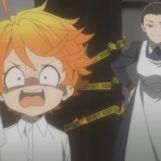The Promised Neverland is, like many other manga and anime series, a story that fails to play to its strengths and ends up feeling like it realized less of its potential than it wasted.
Like most mystery stories, it is structured in a succession of small questions whose answers make the characters and the viewers progress in their search for the truth. Its main weakness is that it fails at making the viewers care about those questions, and thus becomes a plot-driven show with an uninteresting plot.
The first reason why it can be hard to get invested in all those small questions is that as early as the first episode, the show presents viewers with several much bigger and more interesting mysteries: what is the world like outside the orphanage ?, what made it become like this ?, who exactly is Isabella ?, etc. Compared to these mysteries, of which only one really gets looked into, it can feel like most of the events the characters get involved in are secondary and delay the progression of the main plot instead of advancing it.
The way the story is written also participates in this impression of stalling and dullness, for a number of interconnected reasons. One of the most important problems is that it is difficult to get invested in the characters. Indeed, while they are far from being the worst shounen characters around, almost all of them, including the main trio, lack the things that usually make characters engaging: they are rather predictable and generic, they receive no development, have very simple personalities, and no backstory. They are simply very smart children. The only child who undergoes something that could be called development and about whom things are revealed becomes the least believable of them all, and is probably the most archetypal too. The one exception is the character of Isabella, the children’s caretaker, whose combination of cold scheming and warm maternal love is interesting. Her past and motivations are by far the most compelling mysteries of the series, but even she comes off as averagely written, as her level of intelligence doesn’t feel consistent throughout the series. Sister Krone, on the other hand, is an appalling character, with her caricatural expressions, excessive monologues and near absence of plot relevance.
Due to the lack of complexity I described, dialogues between the children, which occupy most of The Promised Neverland’s time, are often lackluster. They are devoid of creativity from both a directing and a writing standpoint, and rarely feature ingenious reasoning. The children simply try to convince one another of doing things that the viewers are already pretty sure they will do (because they actually don’t have much of a choice), and make oddly accurate big assumptions based on the tiny amount of information they have.
Likewise, the battles of wits that are the anime’s main sources of dramatic tension are weakened by how simplistic they are: they all come down to the children trying to hide that they know things to Isabella, and Isabella trying to manipulate them into making flawed assumptions. These battles are often poorly written and very hard to believe, because their structure is one that should make it impossible for Isabella to lose, given how clever she is shown to be and considering the extreme asymmetry of information between the two sides. When she gets tricked, it is only thanks to amateurish plot conveniences, and it feels contrived.
Additionally, the fact that the suppositions the children base their actions on are so fragile makes the numerous twists of the story a lot less powerful, as viewers are bound to expect that some unforeseen event will happen, especially considering how frequently they occur.
Another major issue of The Promised Neverland’s writing is how many holes its plot has: the very premise of the story, though intriguing, is factually absurd, just like the illogically useful nature of the children’s education, how many dangerous possibilities they are carelessly left with, the fact that Isabella almost never takes serious action despite having the power to do it, and many other elements of the series.
Along with its flawed writing, the anime also suffers from questionable choices in its direction, which makes use of some very artificial-sounding ways of creating tension. In a lot of scenes, situations that end up being perfectly harmless are presented in such a manner as to make them seem frightening. On top of betraying the viewers’ expectations and quickly making these scenes lose all power, this repeated absence of consequences undermines the credibility of the narrative as a whole. What’s more, the episodes invariably end on cliffhangers that most of the time turn out to be inconsequential, and the dramatic moments of the series are frequently too overplayed not to come off as inauthentic.
As for the presentation of the anime, it is not bad, but it isn’t very good either. The natural backgrounds are acceptable, but the interiors are often lackluster, and their atmosphere lacks originality. Some of the character designs, such as Isabella’s, are nice, whereas some, like Ray’s, are excessively clichéd.
Overall, The Promised Neverland is not a very satisfying anime to watch. Its mediocre writing and directing make most of the narrative feel inconsequential or difficult to believe, and its constant reliance on deception prevents it from having real payoffs. While its premise and setting seemed interesting, the execution didn’t do them justice and turned them into little more than the theater of a slow succession of heavy dialogues.
